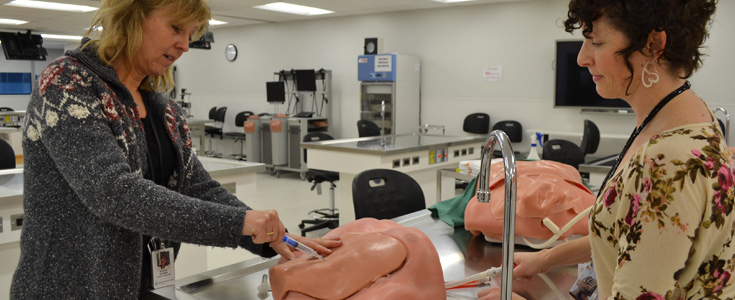
It was a recent visit to the simulation lab that inspired me to reflect on the role continuing education plays in a nurse's career. There was something about seeing learners engaging with new information, tools and each other that reminded me of the important role of continuous learning for nurses.
It's something I encourage you to consider: what role does learning play in your nursing career?
In the early part of our nursing careers, we are often so focused on becoming competent in our skills and knowledge specific to our work setting. It feels like the pressure is on to master these skills so that we can increase not only our confidence but also the confidence of our colleagues in our abilities.
Related links
Sim lab offers hands on learning
A closer look at critical care education
What else can you access on the nursing site to support education?
Once we've mastered them, then what? Does learning simply become a requirement to fulfill licensing requirements? Something we must do to obtain a certain outcome?
I'd invite you to consider learning a little differently. The profession of nursing - and the people we care for - requires each of us to be a continuous learner and teacher. Just as mastering skills and working within scope of practice are professional responsibilities for a nurse - regardless of the practice setting - so is learning and teaching.
Why? Because a culture of discovery creates unlimited possibilities. Creating a culture of discovery - where learning and teaching are integrated into our days and we seize opportunities for both - not only allows our understanding to expand, it allows us to deliver better care and ultimately create better outcomes for the people we care for.
Without excellent teachers, mentors and role models, none of us would have had the capacity to become the nurses we are today. It's the contribution that each person makes to our understanding of nursing practice that helps us grow and our practice deepens and strengthens in powerful ways.
Sometimes that contribution is formal, and made in the classroom. Sometimes that contribution comes from something we read, which inspires us to research a topic further or sketch out an idea we have that could be a solution to an ongoing challenge. Still other times that contribution comes from a conversation we've had with someone who encourages us to consider a different perspective, come at a problem from another angle or asks us to think about something we hadn't previously considered.
Delivering safe, competent care that is based on available evidence is a large part of nursing work. That's why professional nursing practice is based upon ongoing professional and personal development. We need to know the latest and work with the best information to build health and safety for the people we care for.
Education opportunities are offered, sometimes even at no cost, on an ongoing basis throughout the Region. I want you to be aware of these site based learning opportunities, Telehealth and even online learning opportunities through the Learning Management System, or LMS, that can make learning even more convenient.
The Education Portal is one resource that nurses need to bookmark and visit often. A one-stop shop, a variety of education opportunities are available right at your fingertips. Options for managers and staff are available. Along with resources to do your job, you can also find Employee Assistance Program info (including workshops that you can sign up to attend at no cost). Learn about the latest opportunities for quality and safety, clinical, computer training and even orientation.
The nursing website also features formal education opportunities. New events are often highlighted under the "what's new" section of the nursing site. Be sure to bookmark the nursing site and visit often: www.wrha.mb.ca/nursing. For more info on what's available to support your education via the nursing site, please click here.
Weekly, many of these education opportunities are highlighted through Health Care Connection. This region-based resource is delivered to your inbox on Wednesdays. I encourage you to check your email and make sure you access this valuable information. It will help keep you informed about the latest regional priorities, the latest education opportunities and the latest tools to help support your work.
As a nurse with the Winnipeg Health Region, you can also access library resources and services through the University of Manitoba. Click here for more information
One of the biggest barriers can be staff finding time to attend education opportunities. I'd invite you to consider supporting your colleagues - and asking for their support - in their continued development. Often nurses might be better able to attend opportunities with advanced planning. That can mean asking for your manager's support in exploring a topic of importance to you, and realizing that often last-minute changes to schedules can be a difficult request to accommodate. The further ahead you and your manager are able to plan, the easier it may be for you to pursue the opportunities that interest you. At the very least, begin a discussion with your manager about that.
Beyond formal education opportunities in classrooms and lecture halls, each and every facility and site in the Winnipeg Health Region offers a rich learning environment. Each and every day offers countless and continuous opportunities to consider new things.
That's the good news, because being a nurse working in the Winnipeg Health Region, learning and teaching are part of the working environment. Regardless of what setting you work in, your workplace is a classroom. You have the opportunities to make discoveries - and to share them - every single day.
If you're reading this feeling some resistance to that idea, I'd suggest sitting with it for a bit. Why are you uncomfortable thinking about making a contribution - or receiving one - in this way? Perhaps there are skills you'd like to develop so you could feel more confident in sharing what you know. Perhaps you need more support in asking questions or making a contribution. Either way, realizing what is behind your resistance can help offer solutions you can look at implementing so you are fulfilling your professional responsibility.
Once you come back from a training opportunity, for example, do you talk about it with your colleagues? Do you share what inspired you, what got you thinking, what you didn't know that you discovered? I'd encourage you to think about doing just that. Informal opportunities to both teach and learn crop up throughout our days, so seize them as opportunities to share.
Have you considered lately how you can support your colleagues and student learners in the workplace? How are you supporting someone who is new to your workplace? I sometimes hear that nurses feel burdened by students but I would encourage everyone to embrace these opportunities for teaching and learning in the workplace.
Students may approach things differently but they also offer us the chance to make new discoveries. Have you considered how technology might impact your work, for example? Or if the new nurses on your unit are aware of nursing websites that are popular right now that you're not familiar with?
It's your job to create a respectful, supportive working environment where discovery can take place. Kindness and respect are two elements to consider when you remember that at some point, everyone is the both the student and the new person on the team. How would you like to be treated? How were you treated? Consider both and make sure you're creating the most welcoming, positive and supportive work environment that you can.
And don't forget to include students and new people of all disciplines, because otherwise you'll miss rich opportunities to learn from each others. With a Collaborative Care focus as a regional priority, and exciting developments in the relationship between the University of Manitoba and the Region, and a genuine interest and willingness to look at improving health outcomes through collaboration, there has never been a better time to genuinely learn from - and with - your colleagues.
For many, it starts with role clarification. Understanding what other health care providers can do, where your roles overlap and how you can best take care of the person you're all committed to caring for - and make sure what they want is heard too - requires constant learning and teaching. To help support those conversations - and inspire you to work together, we've created a video exploring the six core competencies Collaborative Care. Watch it here.
You may want to consider ways you can extend the collaboration with other sectors, programs or facilities in health care. Many of the Region's most successful recent projects hinge on working together in innovative ways. If opportunities for innovation exist, then it logically makes sense to consider remaining open to learning and teaching opportunities that may arise.
If you're not sure where to start, I'd encourage you to think about reflective practice. Look at a particularly difficult or stressful time and consider what could have been done differently. Could you have made decisions differently? Would that have improved the outcome? How?
And then talk about it with your colleagues. Start discussions on how to best learn from practice situations you find yourself in. This isn't about doing it perfectly. It is about doing the best we can and then learning from the things that don't go as well as we had planned, and avoiding making the same mistakes twice.
As a nurse, it is your professional obligation to learn and teach. It's part of who we are as nurses and it has to be. Investing in your relationships and realizing it's not only an educator's job to educate can help you find rich new opportunities within your nursing practice. It can also help you improve health outcomes and the care you're providing. It can even make work more fun and rewarding.
And then? Tell me how it's going and what's working. I'd love to celebrate your learning and teaching successes with you. Write me at [email protected].
